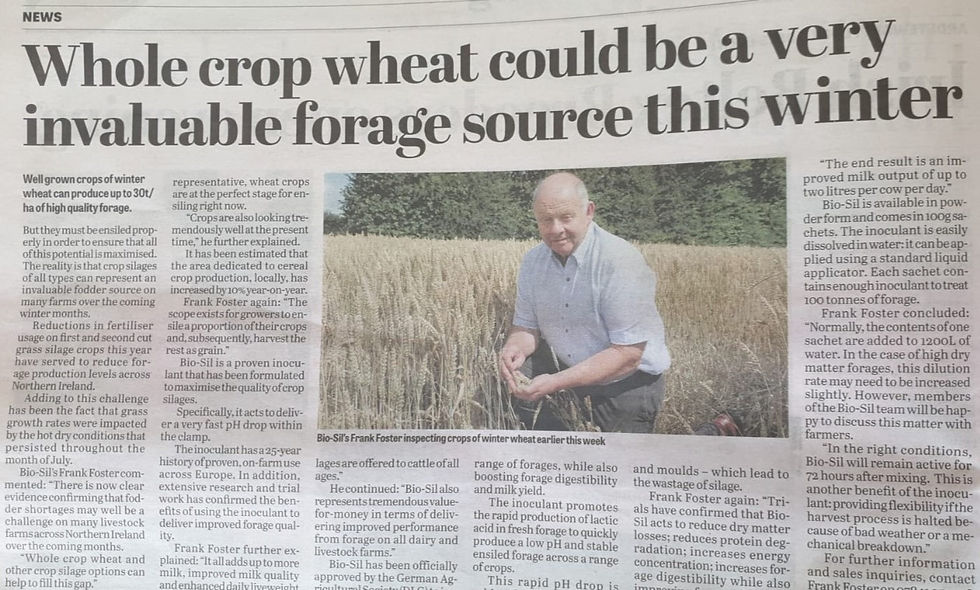Whole crop wheat could be an invaluable forage source this winter
- KPM Partners
- Aug 8, 2022
- 2 min read
Well grown crops of winter wheat can produce up to 30t/ha of high quality forage.
But they must be ensiled properly in order to ensure that all of this potential is maximised. The reality is that crop silages of all types can represent an invaluable fodder source on many farms over the coming winter months.

Bio-Sil’s Frank Foster agrees. He commented:
“There is now clear evidence confirming that fodder shortages may well be a challenge on many livestock farms across Northern Ireland over the coming months. Whole crop wheat and other crop silage options can help to fill this gap.”
According to the Bio-Sil representative, wheat crops are at the perfect stage for ensiling right now. “Crops are also looking tremendously well at the present time,” he further explained. It has been estimated that the area dedicated to cereal crop production, locally, has increased by 10% year-on-year.
Frank Foster again:
“The scope exists for growers to ensile a proportion of their crops and, subsequently, harvest the rest as grain.”
Bio-Sil is a proven inoculant that has been formulated to maximise the quality of crop silages. Specifically, it acts to deliver a very fast pH drop within the clamp. The inoculant has a 25-year history of proven, on-farm use across Europe. In addition, extensive research and trial work has confirmed the benefits of using the inoculant to deliver improved forage quality.

Frank Foster further explained:
“It all adds up to more milk, improved milk quality and enhanced daily liveweight gains when Bio-Sil treated silages are offered to cattle of all ages,” Frank Foster further explained.
“Bio-Sil also represents tremendous value-for-money in terms of delivering improved performance from forage on all dairy and livestock farms.”
Bio-Sil has been officially approved by the German Agricultural Society (DLG) to improve fermentation in a wide range of forages, while also boosting forage digestibility and milk
yield. The inoculant promotes the rapid production of lactic acid in fresh forage to quickly produce a low pH and stable ensiled forage across a range of crops. This rapid pH drop is achieved quickly, thus eliminating the growth of yeasts and moulds – which lead to the wastage of silage.

Frank Foster again:
“Trials have confirmed that Bio-Sil acts to reduce dry matter losses; reduces protein degradation; increases energy concentration; increases forage digestibility while also improving forage intakes by between 0.5 and 1.5kgs per day. The end result is an improved milk output of up to two litres per cow per day.”
Bio-Sil is available in powder form and comes in 100g sachets. The inoculant is easily dissolved in water: it can be applied using a standard liquid applicator. Each sachet contains enough inoculant to treat 100 tonnes of forage.
Frank Foster concluded:
“Normally, the contents of one sachet are added to 1200L of water. In the case of high dry matter forages, this dilution rate may need to be increased slightly. However, members of the Bio-Sil team will be happy to discuss this matter with farmers.
“In the right conditions, Bio-Sil will remain active for 72 hours after mixing. This is another benefit of the inoculant: providing flexibility if the harvest process is halted because of bad weather or a mechanical breakdown.”
For further information and sales inquiries, contact Frank Foster on 07841 954328. Farmers in Antrim and Down should contact Richard Owens on 07990 690857
Comments